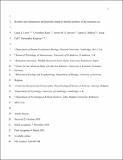Bonobos and chimpanzees preferentially attend to familiar members of the dominant sex
Abstract
Social animals must carefully track consequential events and opportunities for social learning. However, the competing demands of the social world produce trade-offs in social attention, defined as directed visual attention towards conspecifics. A key question is how socioecology shapes these biases in social attention over evolution and development. Chimpanzees, Pan troglodytes, and bonobos, Pan paniscus, provide ideal models for addressing this question because they have large communities with fission–fusion grouping, divergent sex-based dominance hierarchies and occasional intergroup encounters. Using noninvasive eye-tracking measures, we recorded captive apes’ attention to side-by-side images of familiar and unfamiliar conspecifics of the same sex. We tested four competing hypotheses about the influence of taxonomically widespread socioecological pressures on social attention, including intergroup conflict, dominance, dispersal and mating competition. Both species preferentially attended to familiar over unfamiliar conspecifics when viewing the sex that typically occupies the highest ranks in the group: females for bonobos, and males for chimpanzees. However, they did not demonstrate attentional biases between familiar and unfamiliar members of the subordinate sex. Findings were consistent across species despite differences in which sex tends to be more dominant. These results suggest that sex-based dominance patterns guide social attention across Pan. Our findings reveal how socioecological pressures shape social attention in apes and likely contribute to the evolution of social cognition across primates.
Citation
Lewis , L S , Kano , F , Stevens , J M G , DuBois , J G , Call , J & Krupenye , C 2021 , ' Bonobos and chimpanzees preferentially attend to familiar members of the dominant sex ' , Animal Behaviour , vol. 177 , pp. 193-206 . https://doi.org/10.1016/j.anbehav.2021.04.027
Publication
Animal Behaviour
Status
Peer reviewed
ISSN
0003-3472Type
Journal article
Description
This research was supported by a Harvard Mind Brain Behavior Interfaculty Initiative Graduate Student Award and a Harvard GSAS Predissertation Summer Fellowship to L.S.L; Japan Society for the Promotion of Science KAKENHI Grants 19H01772 and 20H05000 to F.K.; European Research Council Synergy Grant 609819 SOMICS to J.C.; and European Commission Marie Skłodowska-Curie Fellowship MENTALIZINGORIGINS to C.K.Collections
Items in the St Andrews Research Repository are protected by copyright, with all rights reserved, unless otherwise indicated.

